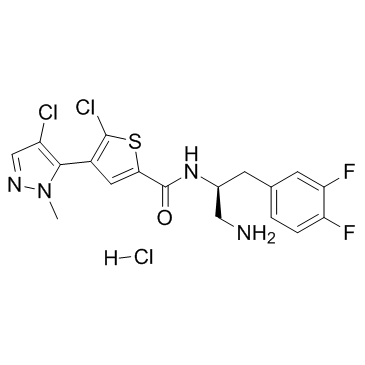GSK2110183 analog 1 hydrochloride

GSK2110183 analog 1 hydrochloride structure
|
Common Name | GSK2110183 analog 1 hydrochloride | ||
|---|---|---|---|---|
| CAS Number | 2070009-64-0 | Molecular Weight | 481.77 | |
| Density | N/A | Boiling Point | N/A | |
| Molecular Formula | C18H17Cl3F2N4OS | Melting Point | N/A | |
| MSDS | N/A | Flash Point | N/A | |
Use of GSK2110183 analog 1 hydrochlorideGSK2110183 hydrochloride is an orally bioavailable, selective, ATP-competitive and potent pan-Akt kinase inhibitor with Kis of 0.08/2/2.6 nM for Akt1/Akt2/Akt3 respectively. |
| Name | GSK2110183 hydrochloride |
|---|---|
| Synonym | More Synonyms |
| Description | GSK2110183 hydrochloride is an orally bioavailable, selective, ATP-competitive and potent pan-Akt kinase inhibitor with Kis of 0.08/2/2.6 nM for Akt1/Akt2/Akt3 respectively. |
|---|---|
| Related Catalog | |
| Target |
Akt1:0.08 nM (Ki) Akt2:2 nM (Ki) Akt3:2.6 nM (Ki) Akt1 E17K mutant:0.2 nM (IC50) PKG1α:0.9 nM (IC50) PKA:1.3 nM (IC50) PKG1β:4 nM (IC50) ROCK:100 nM (IC50) PKCη:210 nM (IC50) P70S6K:251 nM (IC50) RSK1:316 nM (IC50) PKCβ1:430 nM (IC50) PKCθ:510 nM (IC50) |
| In Vitro | GSK2110183 is an ATP competitive, time dependant and fully reversible inhibitors of the Akt kinase family. GSK2110183 has a Ki of 0.08, 2 and 2.6 nM against Akt1, Akt2 and Akt3, respectively. GSK2110183 inhibits the kinase activity of the E17K Akt 1 mutant protein in a standard kinase assay with EC50 of 0.2 nM[1]. |
| In Vivo | Mice bearing BT474 breast tumor xenografts are dosed orally with either vehicle or GSK2110183 at 10, 30 or 100 mg/kg daily for 21 days which result in 8, 37 and 61% TGI, respectively. Mice tolerated GSK2110183 well, with 1-3% body weight loss reported after 5 days of dosing which recover over the course of the study. Other tumor xenograft models which possess an activation of the Akt pathway are explored to further demonstrate compound efficacy. Mice treated with GSK2110183 at 10, 30 and 100 mg/kg result in 23, 37 and 97% TGI, respectively, of SKOV3 xenografts[1]. |
| Kinase Assay | The potency of compounds against Akt enzymes is measured. Since GSK2110183 and GSK2141795 are highly potent inhibitors of the 3 isoforms of Akt, the true potency (Ki) of the inhibitors is initially determined at low enzyme concentrations (0.1 nM Akt1, 0.7 nM Akt2, and 0.2 nM Akt3) using a filter binding assay and then confirmed with progress curve analysis. In the filter binding assay, a pre-mix of enzyme plus inhibitor is incubated for 1 h and then added to a GSKα peptide (Ac-KKGGRARTSSFAEPG-amide) and [γ33P] ATP. Reactions are terminated after 2 h and the radio labeled Akt peptide product is captured in a phospho-cellulose filter plate. Progress curve analysis utilized continuous real-time fluorescence detection of product formation using the Sox-Akt-tide substrate (Ac-ARKRERAYSF-d-Pro-Sox-Gly-NH2) [1]. |
| Cell Assay | Cell lines are typically grown in RPMI 160 medium containing 10% FBS. Some cell lines are grown in media specified by the vendor. A 3-day proliferation assay using CellTiter-Glo is performed to measure the growth inhibition by the compounds at 0-30 µM. Cell growth is determined relative to untreated (DMSO) controls. EC50s are calculated from inhibition curves using a 4- or 6-parameter fitting algorithm in the Assay Client application[1]. |
| Animal Admin | Mice[1] Tumors are initiated by injecting either cells (SKOV3, CAPAN-2 and HPAC) or a tumor fragments (BT474) subcutaneously into 6-8 week female athymic nude (SKOV3) and SCID (all others) mice. Once tumors reach between 120 and 300 mm3, mice are randomized according to tumor volume into groups of n = 7-10 mice per treatment. GSK2110183 (10, 30 or 100 mg/kg daily for 21 days) and GSK2141795 are administered daily at various doses by oral gavage. In combination experiments, GSK1120212 is also administered daily by oral gavage. Tumor volumes and body weight are measured twice weekly, tumor volume is measured with calipers and calculated. |
| References |
| Molecular Formula | C18H17Cl3F2N4OS |
|---|---|
| Molecular Weight | 481.77 |
| Storage condition | 2-8℃ |
| GSK2110183 (hydrochloride) |